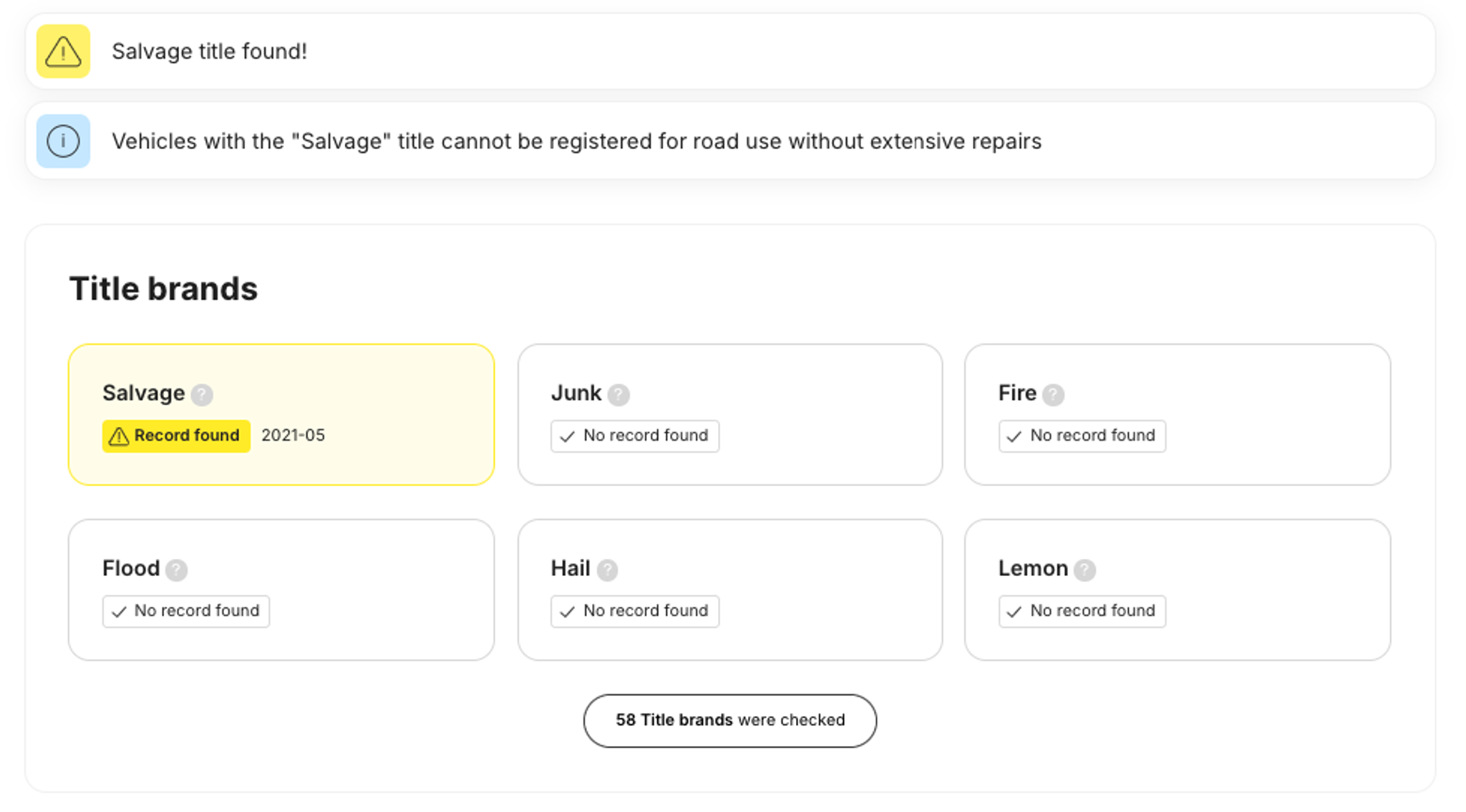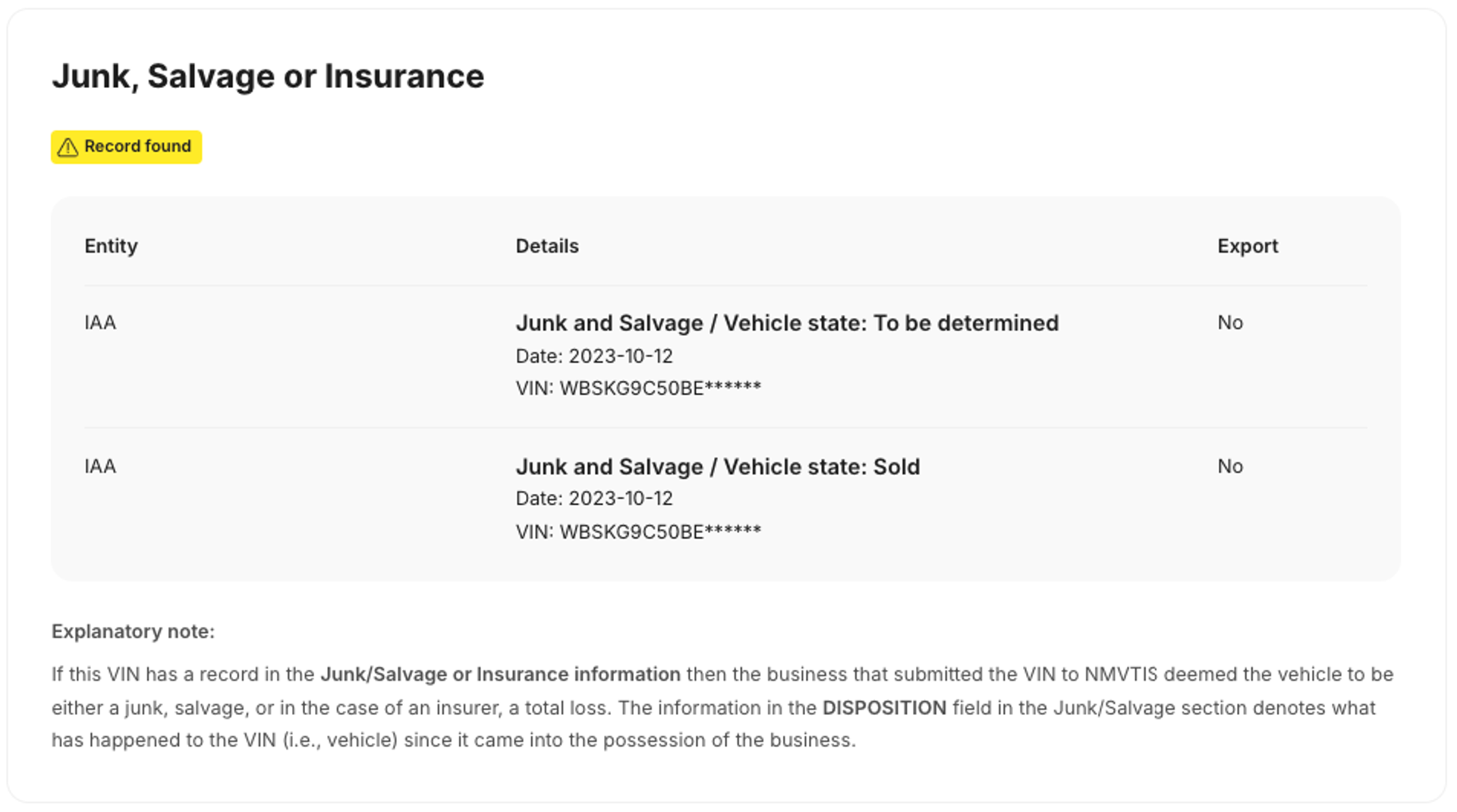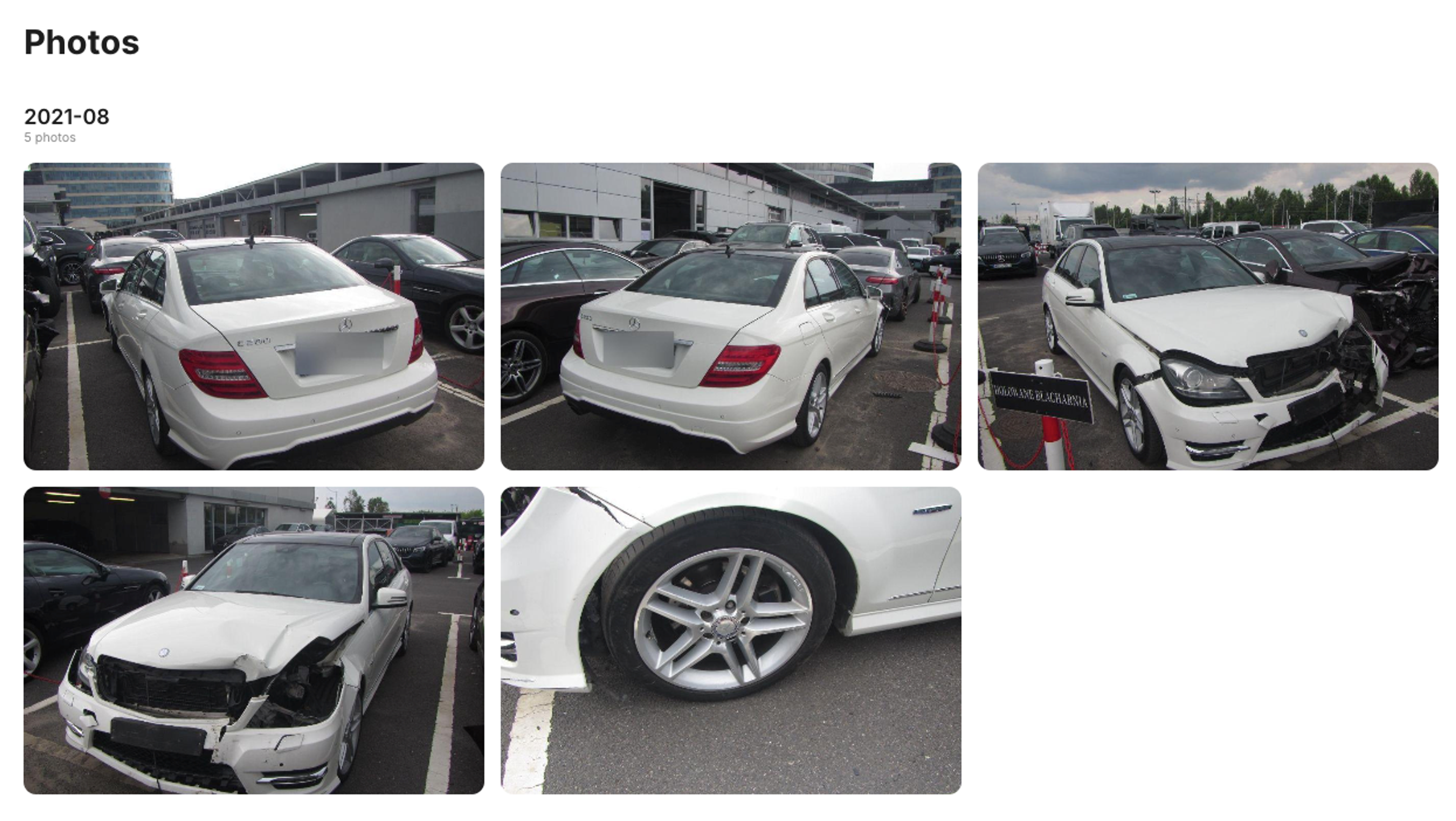11/07/2024
What is a branded title? A guide to car title brands

Evaldas Zabitis

Vehicle ownership documents are different in the United States compared to countries in Europe and other regions. Each car has a title containing basic information about the vehicle and the owner, but much more interesting are “brands” that make car titles “branded” for life.
But what is a branded title and what can you learn from it? Let’s find out in this blog post.
What does a branded title mean?
Brands are like notifications, warning you that the vehicle may have previously sustained some damage. When a significant event happens in a vehicle’s lifetime, its title receives a permanent brand.
Some brands can be replaced after repairing and passing a DMV (Department of Motor Vehicles) inspection, but they can’t be removed completely to ensure transparency when buying and selling used cars.
For instance, instead of removing a salvage brand on a title, DMV replaces it with “vehicle rebuilt” or other similar brands to inform future owners that the vehicle had a salvage title in the past.

Used cars have dark secrets
Reveal them all! Just enter a VIN code and click the button:
Most common car title brands
There are over a hundred title brands, but “hazardous substance contaminated vehicle,” “replica,” and many others are so rare that you probably won’t ever have to deal with them. Only a few brands are widespread, and there’s a high chance that you’ll see them the next time you look for a used car.
Salvage title

“Salvage” is the most common title brand. It reveals that potential expenses to repair a vehicle to its pre-accident condition are higher than the specific percentage of the vehicle’s retail value.
In case of a car accident, an insurance company sends an adjuster to inspect and evaluate the damage. If a car is considered a total loss, its title receives the “salvage” brand. However, you can still repair the vehicle and get a rebuilt title, making it road-legal again.
Rebuilt title
When a vehicle receives a salvage title, but the owner decides to repair it to the pre-accident condition and passes roadworthiness tests, the vehicle’s title receives the “vehicle rebuilt” brand. This means that the vehicle is safe to drive on public roads and can be registered.
Junk title
The junk title shows that the vehicle can’t be registered, has no resale value, and is only suitable for scrap and parts. An insurance company can issue this brand when the vehicle is damaged to the point that it’s not repairable or when the owner sells the car to a salvage yard.
Flood title
When a flood damages a vehicle, it can receive a “flood” brand on its title. This title is normally issued if a car is submerged to the point where water enters the passenger compartment or trunk.
In the early 2000s, most states issued salvage or scrap titles for cars with flood damage, meaning that used car buyers would buy flooded vehicles without knowing it. Water damages electronics and affects lubricants, creating potential future issues and expenses. Thankfully, most states now require vehicle titles to indicate if the vehicle has been flooded.
Lemon title
Cars can receive a lemon title only when they’re still under warranty. When a problem that affects the vehicle’s safety and main functions persists even after several attempts to repair it, a state can brand the title as “lemon.” This means the owner can receive their money back or a fully functioning replacement vehicle with similar specifications.
Each state has its “lemon law,” entitling car manufacturers to ensure a fully functional vehicle throughout the warranty period. However, requirements and regulations vary by state, so check your state’s lemon law before engaging with it.
Totaled title
Totaled or total loss titles are similar to salvage titles, but the main difference is that vehicles with “totaled” brands on their titles can’t be registered anymore, even after repairing them.
Usually, vehicles receive this title when the damage is so severe that it’s unlikely to be restored to a pre-accident condition again.
Odometer-related title brands
Mileage is an essential factor reflecting the vehicle’s condition, and ensuring that the odometer shows genuine mileage is very important. In the United States, odometer inaccuracies are often mentioned in titles with such brands as “not actual,” “maybe altered,” and “replaced.”
What types of information can we learn from title brands?
Vehicle titles usually receive brands for serious reasons. Therefore, they play an important role in the car ownership and transfer of a used vehicle. Car title brands can reveal significant facts about the vehicle’s history, making the used car market more transparent and fair.
Title brands alone don’t provide detailed information, but they can help you reveal potential problems and weak spots.

Let’s take a vehicle with a salvage title as an example. Some car history reports may not show any damage records if they don’t gather data from specific insurance companies, but a salvage title ensures that the vehicle is or was heavily damaged. In that case, you can hire a mechanic to inspect the damage or ensure the damage is repaired properly.
Fire, flood, and hail brands are also very useful in determining the damage. While hailstorms leave dents and cracks on the exterior, cars with fire and flood damage require a thorough electronics inspection to ensure the electrical connectors and control units are dry and functional.
Full list of car title brands
- Salvage – the vehicle has been damaged to the extent that the cost of parts and labor to repair it to a pre-accident condition exceeds a specific percentage of the vehicle’s retail value.
- Rebuilt – the vehicle was branded as “salvage” but has passed DMV inspections, ensuring it’s safe to drive and can be registered. Also known as “prior salvage” or “salvaged.”
- Junk – the vehicle can’t be registered anymore, even if it's repaired. Usually, the car doesn’t have any resale value.
- Flood – the vehicle was/is damaged by a freshwater flood.
- Lemon – if a vehicle breaks down multiple times during its warranty period and the same problem persists even after several attempts to repair it, the vehicle’s title may be branded as “lemon.”
- Totaled – when a vehicle sustains damage that’s not repairable to the point the vehicle would be safe to drive, it can be declared a total loss and receive this title brand.
- Fire – the vehicle is damaged by fire.
- Hail – the vehicle is damaged by hail.
- Saltwater damage – the vehicle is damaged by a saltwater flood.
- Vandalism – the vehicle is damaged by vandals.
- Dismantled – the vehicle can't be legally driven and can only be sold for parts.
- Reconstructed or refurbished – the vehicle’s original construction is modified.
- Collision – the vehicle is damaged by collision.
- Prior taxi – the vehicle was registered as a taxi.
- Prior police – the vehicle was registered as a police.
- Former rental – the vehicle was used as a rental.
- Antique – the vehicle is over 50 years old.
- Classic – the vehicle is at least 20 years old and meets specific criteria.
- Street rod – the vehicle is modified but meets jurisdiction-specific criteria.
- Agricultural vehicle – the vehicle is used for agricultural purposes.
- Logging vehicle – the vehicle is used for logging purposes.
- Replica – the vehicle’s body is built to resemble and be a reproduction of another vehicle of a given year and manufacturer.
- Owner retained – the vehicle is declared a total loss, but the owner still has it.
- Recovered theft – the vehicle was previously titled as salvage due to theft but has been repaired and inspected. Therefore, it may be driven legally.
- Kit – the vehicle has been built by combining a chassis with a different frame, engine, and body parts. In that case, the actual vehicle’s identification number (VIN) is on the chassis.
- Re-manufacture – the vehicle was reconstructed by the manufacturer.
- Warranty return – the vehicle was returned to the manufacturer because of a breach in the warranty.
- Reissued VIN – the chassis number (VIN) was reissued. For instance, the same VIN is reused.
- Reserved eliminated bond posted – the vehicle has a bond because its ownership cannot be proven. It can be sold and titled.
- Memorandum copy – the vehicle has a facsimile title.
- Prior owner retained – the vehicle had a salvage title, but the owner kept the vehicle and sold it.
- Vehicle non-conformity uncorrected – a non-safety defect reported to the jurisdiction by the vehicle manufacturer remains uncorrected.
- Vehicle non-conformity corrected – a non-safety defect reported to the jurisdiction by the vehicle manufacturer has been corrected.
- Vehicle safety defect uncorrected – a safety defect reported to the jurisdiction by the vehicle manufacturer remains uncorrected.
- Vehicle safety defect corrected – a safety defect reported to the jurisdiction by the vehicle manufacturer has been corrected.
- Hazardous substance contaminated vehicle – the vehicle has been contaminated with a hazardous substance and is unsafe to use.
- State-assigned VIN – VIN is replaced by a new state-assigned VIN number.
- Gray market not compliant – the vehicle was manufactured for use outside the United States and doesn’t comply with applicable federal standards.
- Gray market compliant – the vehicle was manufactured for use outside the United States but complies with applicable federal standards.
- Salvage stolen – the reporting jurisdiction considers the vehicle salvage because an insurance company has acquired ownership pursuant to a settlement based on the theft of the vehicle.
- Salvage other – the vehicle acquired salvage title due to other reasons than damage or theft.
- Disclosed damage – the vehicle was damaged to the extent that the damage had to be disclosed under the jurisdiction's damage disclosure law.
- Vehicle crushed – the frame or chassis of the vehicle has been crushed or otherwise destroyed.
- Export-only vehicle – the vehicle has a salvage or junk title and is determined for exportation outside the United States.
- Actual odometer – the mileage on the odometer is true.
- Not actual odometer – it’s known that the mileage on the vehicle’s odometer is not true.
- Odometer exceeds mechanical limits – the odometer has reached its mechanical limits, therefore, the shown mileage is lower than the actual one.
- Odometer may be altered – an alteration to the odometer leads to a belief that the mileage on the odometer may not be true.
- Odometer tampering – the odometer was tampered with.
- Exempt odometer disclosure – the vehicle’s ownership can be changed without disclosing the odometer reading.
- Odometer replaced – the odometer in the vehicle was replaced at some point.
- Odometer reading at the time of renewal – the odometer reading was recorded when the registration was renewed.
- Odometer discrepancy – the previously recorded values of the odometer lead to a belief that the mileage on the odometer may not be true.
- Car title division – there’s a problem with the odometer that can’t be printed on the title.
Pros and cons of cars with branded titles: why you should or shouldn’t buy one
The main factor about cars with branded titles is that they tend to be cheaper initially but can be more expensive in the long term if not chosen carefully. If a vehicle is repaired properly and can be registered for road usage, its title is probably branded thus, the car should cost less.
Remember that you should have an expert inspect the vehicle first – don’t just buy it hoping for a bargain.
Cars with clean (not branded) titles are more desirable, and car dealers know that. In fact, some dealers even publish videos stating that branded titles are better than clean titles, with the main argument being that they at least reveal damages, while clean titles may hide something. This may be true on rare occasions, but it mostly happens when car titles are “washed.”
Be aware of washed car titles
“Title wash” is a procedure that removes any title brands, making the title clean. Some car titles are washed accidentally, but it’s mostly done intentionally to increase the vehicle’s worth illegally.
Accidental title washing can happen when transferring the title from one state to another. As title regulations and requirements vary by state, sometimes “rebuilt” or “reconstructed” titles are registered as “clean” automatically.
These differences also create various legal loopholes that scammers tend to take advantage of. For example, 13 businesses and 19 people were charged with car title washing as they submitted fraudulent title applications of totaled vehicles to the DOT and received clean titles.
Unfortunately, there isn’t a guaranteed way to expose washed car titles, but extensive research drastically reduces the chance of getting involved with them. For example, you can properly inspect the vehicle and check its history to reveal data about issues from other sources.

While a thorough inspection can reveal potential weak spots, a history check can help you find out about previous car damage, mileage records, ownership changes, title brands, and more.

Check your VIN
Avoid costly problems by checking a vehicle's history. Get a report instantly!
Frequently asked questions

Article by
Evaldas Zabitis
Evaldas has been writing since middle school and has had a passion for cars for as long as he can remember. Right after getting his driver’s license, he spent all of his savings on shoddy cars so he could spend time fixing, driving, and selling them. Evaldas is always interested in automotive technical innovations and is an active participant in automotive community discussions.
